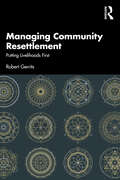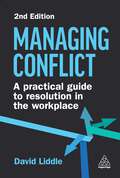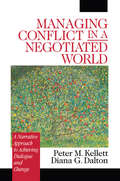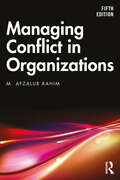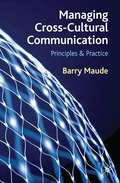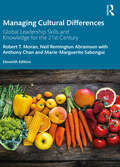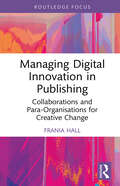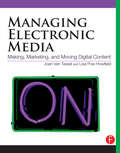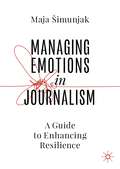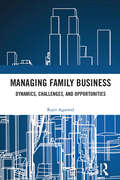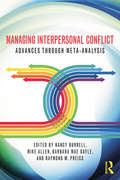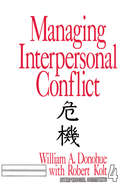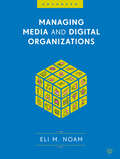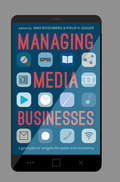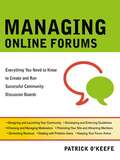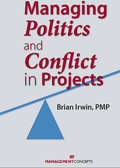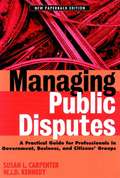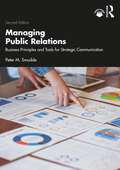- Table View
- List View
Managing Community Resettlement: Putting Livelihoods First
by Robert GerritsEach year millions of people are displaced from their homes and lands. While international environmental and social performance standards on land access and involuntary resettlement exist, no framework supporting livelihood restoration has been developed. This book provides a framework that will help improve practice for those who are involved in resettlement projects and, crucially, improve the outcomes for the resettlement-affected households and communities. Evidence from the implementation of public- and private-sector-led resettlement projects indicates that livelihood restoration is a persistent shortcoming, if not failure, across these projects. This book addresses this issue by re-characterising the ‘livelihood restoration’ objective as ‘livelihood re-establishment and development’ and proposes a framework for the entire resettlement process that puts livelihood considerations first. The framework enables proactive identification of the potential livelihood challenges associated with each step of the resettlement process (design, planning, execution, monitoring and evaluation), as well as the opportunities that resettlement, project development and induced economic growth create. This book is essential reading for experts in social impact assessment, resettlement specialists, planners, administrators, non-governmental and civil society organisations and students of development studies and social policy.
Managing Conflict: A Practical Guide to Resolution in the Workplace
by David LiddleWhether it's a disagreement between colleagues, a dispute with management or large-scale industrial action, conflict at work is a perennial problem for organizations, their people and profits.The second edition of Managing Conflict shows HR professionals how to tackle these problems by not only resolving current issues, but also preventing future instances of conflict. It includes the latest research and case studies showing how conflict management has been impacted by hybrid working models and digitalization. There are also updates to reflect how resolution is a driver of trust in organizations, enabling people to disagree more constructively in a safe environment.This book covers the causes and costs of conflict, the impact of the psychological contract and the legal framework for managing workplace disputes both in the UK and internationally. It shows how to design a conflict management strategy, develop a formal resolution process and engage stakeholders and training managers in resolution and mediation skills. Packed with best practice examples from organizations such as Tesco, Burberry and Nationwide Building Society as well as conflict resolution resources and toolkits, this book is essential reading for all HR professionals looking to resolve conflict in the workplace.
Managing Conflict in a Negotiated World: A Narrative Approach to Achieving Productive Dialogue and Change
by Diana G. Dalton Dr Peter M. KellettKellett and Dalton present a core text in Conflict Management derived from extensive class testing of their material. Their book helps readers understand the elements of conflict and act on that understanding by managing conflict better in each area of their lives - work, family, and community.
Managing Conflict in a Negotiated World: A Narrative Approach to Achieving Productive Dialogue and Change
by Dr. Peter M. Kellett Diana G. DaltonKellett and Dalton present a core text in Conflict Management derived from extensive class testing of their material. Their book helps readers understand the elements of conflict and act on that understanding by managing conflict better in each area of their lives - work, family, and community.
Managing Conflict in Organizations
by M. Afzalur RahimManaging Conflict in Organizations introduces the origins, forms, benefits, and consequences of organizational conflict to students and practitioners and teaches how best to manage conflict to achieve productive outcomes. Conflict has benefits: it may lead to solutions to problems, creativity, and innovation. In contrast, little or no conflict in organizations may lead to stagnation, poor decisions, and ineffectiveness. This book is a vigorous analysis of the rational application of conflict theory in organizations for organizational behavior students, as well as practitioners looking to practice constructive conflict management in their work. This fifth edition has been thoroughly updated to reflect the latest research in the field and explains the effect that research has on practice, with an expanded range of practical examples and cases. It covers emergent topics such as: • Differentials in conflict management styles across generations. • Technology and its effect on conflict style changes. • Cross-cultural studies and diversity. This text is a valuable resource for students, instructors, and researchers in human resource management and organizational behavior, and a practical handbook for practitioners that manage (or manage upward) their colleagues.
Managing Cross-cultural Communication: Principles And Practice
by Barry MaudeAn accessible and lively introduction to the management of cross-cultural communication for undergraduate and graduate business students. Drawing on the latest research and incorporating the author's own extensive experience of working in different cultural settings, it addresses the core theory and practice. An essential course companion.
Managing Cultural Differences: Global Leadership for the 21st Century (Managing Cultural Differences Ser.)
by Robert T. Moran Neil Remington AbramsonIn today’s global business environment, it is vital that individuals and organizations have sophisticated global leadership skills. Communication and understanding of different cultures is paramount to business success. This new edition of the bestselling textbook, Managing Cultural Differences, guides students and practitioners to an understanding of how to do business internationally, providing practical advice on how competitive advantage can be gained through effective cross-cultural management. Crises in the Middle East, the weakening of some emerging markets, and the value of diversity and inclusion are just a few examples of contemporary issues discussed in this text, which also introduces a completely new chapter on global business ethics. With a wealth of new examples, case studies, and online materials, this textbook is required course reading for undergraduates, postgraduates, and MBA students alike, as well as being a vital tool for anybody selling, purchasing, traveling, or working internationally.
Managing Cultural Differences: Global Leadership Skills and Knowledge for the 21st Century
by Robert Moran Neil Abramson Anthony Chan Sabongui Marie-MargueriteIn today’s global business environment, it is vital that individuals and organizations have sophisticated global leadership skills. Communication and understanding of different cultures are paramount to business success. This new edition of the bestselling textbook Managing Cultural Differences guides students and practitioners to an understanding of how to do business internationally, providing practical advice on how competitive advantage can be gained through effective cross-cultural management. The digitization of the workplace, the integration of artificial intelligence into workplace cultures, cultural responses to crisis, and the value of diversity and inclusion are just a few examples of contemporary issues discussed in this text. This latest edition also begins with a completely new introductory chapter, which provides an overview and connects the themes between chapters for an integrated understanding of the topic. With a wealth of new examples, case studies, and online materials, this textbook is required course reading for undergraduates, postgraduates, and MBA students alike, as well as being a vital tool for anybody selling, purchasing, traveling, or working internationally.
Managing Digital Innovation in Publishing: Collaborations and Para-Organisations for Creative Change
by Frania HallReflecting proactively on a growing industry 'dilemma', this book explores how publishing businesses can and do successfully experiment and innovate in digital publishing through collaboration.Many sectors of publishing are still structured around print production, with digital innovation in the consumer arena generally focused on different book formats, such e-books and audiobooks, rather than on brand-new types of products. Publishers need to innovate around different sorts of content and digital formats as consumers change their media habits. However, their pricing, business and risk models, and workflows are reflective of a legacy of print publishing; and as print commands so much revenue, publishers do not want to derail their main business as they experiment. Drawing on an analysis of collaboration and network theory and four in-depth qualitative case studies in different sectors, this research suggests that collaboration, particularly engaging with the wider creative sector, is key to the sustainable development of new types of products. It points to the characteristics of a successful digital collaboration and explains how to manage publishing innovation alongside the existing business, through para-organisations. Considering novel approaches to innovation, such as iterative software-style approaches and agile project management, as well as new business models, such as those employed in games development, the author shows how introducing new people – from software developers to competitors – can help instill a collaborative mindset within the organisation and facilitate constructive experimentation.Managing Digital Innovation in Publishing will be of interest to upper-level students and researchers of (digital) publishing and related creative industries.
Managing Electronic Media: Making, Moving and Marketing Digital Content
by Joan Van TasselThis college-level media management textbook reflects the changes in the media industries that have occurred in the past decade. Today's managers must address new issues that their predecessors never faced, from the threats of professional piracy and casual copying of digital media products, to global networks, on-demand consumption, and changing business models. The book explains the new new vocabulary of media moguls, such as bandwidth, digital rights management, customer relations management, distributed work groups, centralized broadcast operations, automated playlists, server-based playout, repurposing, mobisodes, TV-to-DVD, and content management. The chapters logically unfold the ways that managers are evolving their practices to make content, market it, and deliver it to consumers in a competitive, global digital marketplace. In addition to media companies, this book covers management processes that extend to all content-producing organizations, because today's students are as likely to produce high-quality video and Web video for ABC Computer Sales as they are for the ABC Entertainment Television Network.
Managing Emotions in Journalism: A Guide to Enhancing Resilience
by Maja ŠimunjakThis textbook offers the first practical guide to managing emotions in everyday journalism work based on interviews with more than 30 British journalists. It raises awareness of emotional situations and stressors journalists may face, so practitioners are better able to recognise these and prepare for them, and outlines practical emotion management strategies which they can apply to enhance their emotional intelligence and resilience and consequently, feel and perform better in the workplace. It includes vignettes written by journalists from the United Kingdom, United States, Australia and Croatia, as well as practical scenario exercises that prompt readers to reflect on how they would feel and react in specific situations based on journalists’ everyday work.
Managing Environmental Conflict: An Earth Institute Sustainability Primer (Columbia University Earth Institute Sustainability Primers)
by Joshua D. FisherConflicts frequently arise over environmental issues such as land use, natural resource management, and laws and regulation, emerging from diverging interests and values among stakeholders. This book is a primer on causes of and solutions to such conflicts. It provides a foundational overview of the theory and practice of collaborative approaches to managing environmental disputes.Joshua D. Fisher explains the core concepts in collaborative conflict management and presents a clear, practical, and implementable framework for understanding and responding to environmental disputes. He details strategies to bring stakeholders together in pursuit of collective solutions, emphasizing ongoing processes of dialogue, analysis, action, and learning. This collaborative approach can create new opportunities for stakeholders to better understand each other and the natural world, which enables more effective and context-appropriate environmental governance. The primer examines why and how system dynamics can constrain or expand the possibility of constructive management of conflicts. It features a case study from the Amazon Basin, where local communities, extractive industry operators, conservationists, and land managers have often clashed over access to natural resources, drawing out lessons to illustrate how to adapt the conflict management framework to distinct contexts.Managing Environmental Conflict synthesizes knowledge, methods, and practices spanning consensus building, collaborative governance, complex adaptive systems science, environmental conflict resolution, and environmental peacebuilding. Its presentation of this important and timely topic will be invaluable for academics and practitioners alike, including decision makers, scientists, and conflict management professionals.
Managing Family Business: Dynamics, Challenges, and Opportunities
by Rajiv AgarwalThis book explores the unique characteristics and complexities of family businesses in India. It examines the intersection of family dynamics, cultural norms, and business practices, to offer valuable insights on how family businesses evolve, develop, grow, and sustain over time. With a focus on leadership and positioning for the future, this book illustrates how the family enterprise can achieve sustained growth and continuity through generations. Covering a wide range of topics essential for understanding the Indian family business landscape, this volume: Studies succession planning and governance, managing family conflicts and harnessing innovation Analyses the various strengths and weaknesses of family businesses Shares insights on top-performing family businesses alongside the oldest businesses in India and across the world Emphasises and extensively discusses the role of women in the contemporary Indian business landscape Insightful and engaging, this book will be useful to students, researchers, and teachers in the fields of business management, commerce, and economics. It will also be an invaluable resource for present or potential family business owners, managers, professionals, and business consultants.
Managing Family Business: Dynamics, Challenges, and Opportunities
by Rajiv AgarwalThis book explores the unique characteristics and complexities of family businesses in India. It examines the intersection of family dynamics, cultural norms, and business practices to offer valuable insights on how family businesses evolve, develop, grow, and sustain over time. With a focus on leadership and positioning for the future, this book illustrates how the family enterprise can achieve sustained growth and continuity through generations.Covering a wide range of topics essential for understanding the Indian family business landscape, this volume: Studies succession planning and governance, managing family conflicts and harnessing innovation Analyses the various strengths and weaknesses of family businesses Shares insights on top-performing family businesses alongside the oldest businesses in India and across the world Emphasises and extensively discusses the role of women in the contemporary Indian business landscape Insightful and engaging, this book will be useful to students, researchers, and teachers in the fields of business management, commerce, and economics. It will also be an invaluable resource for present or potential family business owners, managers, professionals, and business consultants.
Managing Intercultural Conflict Effectively
by Dr Stella Ting-Toomey Dr John G. OetzelIn this volume, Ting-Toomey and Oetzel accomplish two objectives: to explain the culture-based situational conflict model, including the relationship among conflict, ethnicity, and culture; and, second, integrate theory and practice in the discussion of interpersonal conflict in culture, ethnic, and gender contexts. While the book is theoretically directed, it is also a down-to-earth practical book that contains ample examples, conflict dialogues, and critical incidents. Managing Intercultural Conflict Effectively helps to illustrate the complexity of intercultural conflict interactions and readers will gain a broad yet integrative perspective in assessing intercultural conflict situations. The book is a multidisciplinary text that draws from the research work of a variety of disciplines such as cross-cultural psychology, social psychology, sociology, marital and family studies, international management, and communication.
Managing Interpersonal Conflict: Advances through Meta-Analysis (Routledge Communication Series)
by Nancy A. Burrell Mike Allen Barbara Mae Gayle Raymond W. PreissManaging Interpersonal Conflict is a systematic review of conflict research in legal, institutional and relational contexts. Each chapter represents a summary of the existing quantitative social science research using meta-analysis, with contexts ranging from jury selection to peer mediation to homophobia reduction. The contributors provide connections between cutting-edge scholarship about abstract theoretical arguments, the needs of instructional and training pedagogy, and practical applications of information. The meta-analysis approach produces a unique informational resource, offering answers to key research questions addressing conflict. This volume serves as an invaluable resource for studying conflict, mediation, negotiation and facilitation in coursework; implementing and planning training programs; designing interventions; creating workshops; and conducting studies of conflict.
Managing Interpersonal Conflict
by William A. DonohueThis book explores the process of interpersonal conflict - from the initial decision as to whether or not to confront differences through to how to plan the actual confrontation. It deals extensively with negotiation and, where negotiation proves unsuccessful, with third-party dispute resolution. To avoid destructive or violent behaviour, Donohue emphasizes the importance of keeping conflicts under control and of focusing on the pertinent issues. He argues that the key to managing conflict is to address differences collaboratively so that the parties can create better solutions and, ultimately, strengthen their relationships.
Managing Media and Digital Organizations
by Eli M. NoamWhat does it take for success in the media business? Creativity, innovation, and performance, of course. Plus experience and good judgment. However, it also requires an understanding of the principles and tools of management. This book summarizes the major dimensions of a business school curriculum and applies them to the entire media, media-tech, and digital sectors. Its chapters cover—in a jargonless, non-technical way—the major management functions. First, creating a media product: the financing of projects and the management of technology, HR, production operations, intellectual assets, and government relations. Second, harvesting the product created: market research, marketing, pricing, and distribution. And third, is the control loop: media accounting and strategy planning. The book’s interdisciplinary approach goes beyond an industry-by-industry coverage and centers around management functions. In the process, this book becomes an indispensable resource for those aiming for a career in the media and digital field, both in startups and established organizations. It is also a work that helps advance the entire field—the management of information resources and products—to a more central role in business analysis. This book is designed to help those already in the sector or those joining it to become creative managers and managerial creatives. It aims to make managers in this field more knowledgeable, less blinded by hype, more effective, more productive, and more responsible.
Managing Media Businesses
by Mike Rosenberg Philip H. SeagerThis book is a practical guide to every aspect of managing media businesses. Written by a team of experts and illustrated with interviews from leading industry players, it addresses the unprecedented change and uncertainty facing the industry.Do newspapers, magazines or books have a future? Will terrestrial television or cable services exist as meaningful players in five years’ time? Is there a way to make multiple consumption platforms work together in a way that extracts the revenue needed to support the creation and development of quality content? While more and more content is being published, fewer and fewer businesses are finding a way to do so profitably and sustainably.Your answers to these questions that vex your media or entertainment business will depend on your frame – a frame based on experience gained in days that were less uncertain, less fluid and much, much simpler. Those frames need to be broken if you are to survive in times of such rapid change. This book is based on IESE’s Advanced Management Program in Media & Entertainment, which IESE Business School has been running in New York and Los Angeles since 2011. It combines contributions from leading professors and practitioners, as well as real-life case studies, to establish a base upon which you can start to build the set of managerial tools that you will need to manage fast-changing media and entertainment businesses.
Managing Online Forums: Everything You Need to Know to Create and Run Successful Community Discussion Boards
by Patrick O'KeefeEvery day, millions of users log on to their favorite online forums and interact with others to get advice and discuss everything from the latest news and trends to their hobbies, professions, and whatever else strikes their fancy. Administrators have to lead these communities, deal with difficult users, and choose moderators. Legal constraints, spammers, and technical issues can turn the excitement of running an online community into chaos. With the right guidance, however, running forums can be a pleasure. Patrick O’Keefe has spent years developing and managing online communities. Now, he shows readers how to make the right decisions about every aspect of their forums, including:• choosing a name and domain name• picking the right software• deciding on user options like avatars and private messaging• setting guidelines and dealing with violators• ensuring that posts stay on topic• settling online disputes among users• involving users and keeping the site interestingManaging Online Forums is the one book that shows site owners and administrators how to create a safe and entertaining community that users will return to again and again.
Managing Online Reputation: How to Protect Your Company on Social Media (Palgrave Pocket Consultants)
by Charlie PownallManaging Online Reputation is a comprehensive look at online reputation management. Drawing on recent examples of organizations managing their online reputations effectively and ineffectively, it provides a practical and visual tool-kit of processes and techniques to help limit and respond effectively to negative situations on social media.
Managing Politics and Conflict in Projects
by Brian Irwin PMP, MSMManaging Politics and Conflict in Projects is an easy-to-read, no-nonsense guide that walks you through the “soft” issues of project management, including communicating, negotiating, and influencing skills that are vital to your project success. Understand your organization's political climate and culture and ascend the corporate ladder to the next level as a project manager. Learn how to deal with political issues requiring complex organizational and interpersonal skills, using valuable review points, tips, and a fictional narrative illustrating the book's main points. •Improve and develop your leadership, interpersonal, and communications skills•Negotiate your political environment•Acknowledge and overcome challenges inherent in project management•Enhance your career by effectively utilizing politics and conflict•Recognize and interpret the barriers of communication•Be prepared to enter into a negotiation•Overcome cultural challenges
Managing Public Disputes: A Practical Guide for Government, Business, and Citizen's Groups
by Susan Carpenter W.J.D. KennedyFor more than a decade, Managing Public Disputes has been the first choice, hands-on guide for managers, offering useful instructions for handling a wide range of large and small public controversies from the national to the community level. <p><p> It includes: Ten proven principles for managing conflict, A comprehensive framework with step-by-step procedures for creating productive outcomes, Seven illustrative case examples, Detailed advice on effective methods for collecting information, conducting interviews, and analyzing a conflict situation, Suggestions for handling special problems such as reluctant participants, keeping people at the negotiation table, and handling situations where emotions are running high, Eight tasks targeted for designing an overall strategy for managing public disputes
Managing Public Relations: Business Principles and Tools for Strategic Communication, 2e
by Peter M. SmuddeThe second edition of Managing Public Relations introduces students to the key concepts and practices involved in the day-to-day running of a PR operation, whether it is a company department, an independent agency, or any organized group focused on PR. The book’s unique approach places the PR function within the broader context of an organization, equipping students with the essential business knowledge, perspective, and skills needed when starting out in their careers. This second edition has been fully updated throughout and includes: • Current examples and testimonials from across the globe, as well as updated "Executive Viewpoints." • Expanded content on strategic planning, budgeting, and financial statements. • Detailed commentary on topics relevant to the modern workplace, including remote management. • Consideration of diversity, inclusion, equity, and access within PR. • Additional content on the use of analytics and measuring return on investment (ROI). • Updated online material, including an Instructor’s Manual that incorporates problem-based questions, example assignments, and activities. A highly practical and comprehensive guide, this textbook should be essential reading for advanced undergraduate and postgraduate students studying public relations management, strategic communications and marketing management.
Managing Public Relations: Business Principles and Tools for Strategic Communication, 2e
by Peter M. SmuddeThe second edition of Managing Public Relations introduces students to the key concepts and practices involved in the day-to-day running of a PR operation, whether it is a company department, an independent agency, or any organized group focused on PR. The book’s unique approach places the PR function within the broader context of an organization, equipping students with the essential business knowledge, perspective, and skills needed when starting out in their careers. This second edition has been fully updated throughout and includes: Current examples and testimonials from across the globe, as well as updated "Executive Viewpoints" Expanded content on strategic planning, budgeting, and financial statements Detailed commentary on topics relevant to the modern workplace, including remote management Consideration of diversity, inclusion, equity, and access within PR Additional content on the use of analytics and measuring return on investment (ROI) Updated online material, including an Instructor’s Manual that incorporates problem-based questions, example assignments, and activities A highly practical and comprehensive guide, this textbook should be essential reading for advanced undergraduate and postgraduate students studying public relations management, strategic communications and marketing management.
